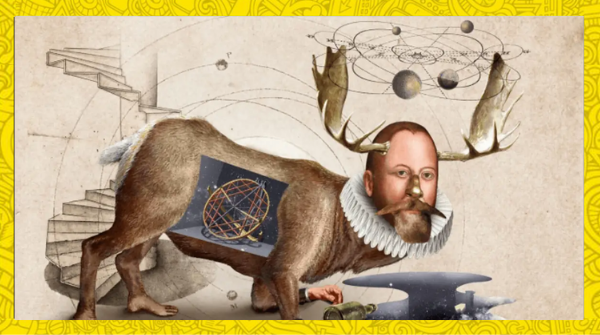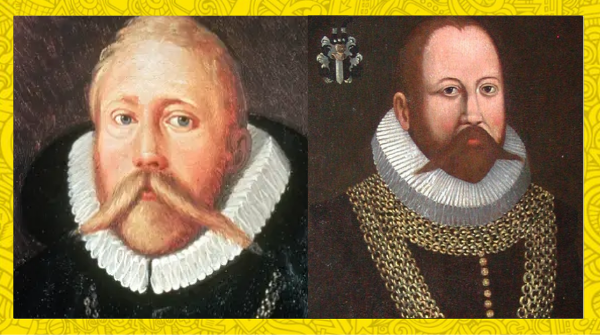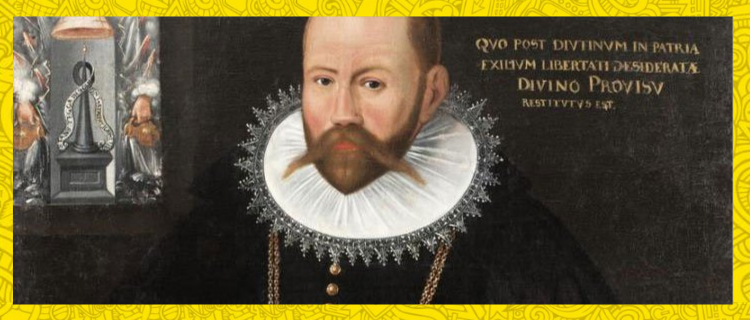Science may have several great brains like Einstein and Hawkings, but nobody like Tycho Brahe. It is easy for people to assume that the life of a scientist would be boring, deprived of social activities, and confined to their laboratories. For many scientists, this assumption might be true but for Brahe, it is entirely misleading. As beyond the wonder of his astronomical genius, Brahe had a life much greater and perhaps the most scandalous in the history of scientists.
From being kidnapped at a young age to doping a gold nose, Tycho Brahe is a man-off Kitler and larger than life.
Tyge Ottesen Brahe also known as Tycho Brahe was born on 14 December 1546. He was an heir to several of Denmark’s most influential noble families. He was the oldest among all 12 siblings and his twin brother died before being baptized. When Brahe turned two years old, he was taken away and kidnapped by his uncle Jørgen Thygesen Brahe and his wife Inger Oxe, which was oddly okay with his original parents. He was raised by his uncle in Langeland who was childless.
From ages 6 to 12, Tycho attended Latin school, probably in Nykøbing. At age 12, on 19 April 1559, Tycho began his studies at the University of Copenhagen. As his uncle always wanted him to study law, Brahe enrolled in a law school but after witnessing a solar eclipse when he was 13, Tycho became interested in astronomy. He began spending more time with mathematics and science teachers and learned the art of celestial observation. His uncle later sent him to Germany to study law, but by that time he has already lost his interest in law and instead concentrated purely on astronomy.

He used to make observations of the night sky and read astronomy books. It wasn’t long before his measurements became more accurate than the ones written in books. In 1566, Tycho left to study at the University of Rostock. During his days in Germany, he once got into an argument with a Danish nobleman named Manderup Parsbjerg. The feud was started over a disagreement about a mathematical formula. In the 16th century, there weren’t enough resources like the internet to prove who is right or wrong, the answer could be assumed on resolving their feud with a duel.
Thus the duo engaged into a sword duel and Tycho ended up losing a huge chunk of his nose. For the rest of his life, Brahe wore a prosthetic nose. His fake nose was made of copper or brass and he probably wore gold and silver noses on special occasions. And because his astronomical research has nothing to do with his nose, he continued his research. He kept studying the night sky and created all sorts of instruments including a mid-sized quadrant for measuring the angle of stars.
He also discovered a new star in the constellation Cassiopeia after months of observations. This study was a turning point in his life and he became an overnight sensation and was offered several scientists positions in Europe. Thus, in order to keep him at home, the King of Denmark gave Brahe an island with an art observatory. It was more like a castle with gardens, guards, and rooms for family and staff. It also had an underground section for giant instruments. It is assumed that he possessed at least 1% of the entire wealth of Denmark, and five times that much was spent by the Danish government on Brahe’s astronomical research. Tycho Brahe built a paper mill and printing press for his research work.
In 1571, Tycho fell in love with a woman named Kirsten. She was a commoner thus many of Tycho’s family disapproved of her. He never officially married Kirsten as their marriage could result in losing his noble privileges. However, during that time Danish law permitted morganatic marriage which meant that a woman and man could live together for 3 years, and their alliance could be recognized as a legal marriage. However, they both will maintain their social statuses and their children will be born as commoners. They will not be eligible for any advances like their rights to titles and landholdings attached with their Father’s noble name.
To keep him entertained Tycho also employed a court jester called Jepp, who he believed possessed psychic powers. He also owned an elk, a tame beast that Brahe kept as a prized pet. But all these advances were lost when a new Danish king was appointed who despised Tycho. After falling out, Tycho accepted an invitation from a Roman emperor and became the official imperial astronomer in Prague.
Did Tycho Brahe die of pee or poison?

Here he met another astronomer named Johannes Kepler and made him his assistant. Though Kepler appreciated his work, they would often argue over Tycho’s research. Brahe suddenly contracted a bladder disease. After attending a banquet in Prague, he died eleven days later, on 24 October 1601, at the age of 54. Yet, even after more than 400 years of his death, he still bears secrets like nobody else. In 2010, when his body was exhumed and studied, his famous prosthetic gold nose was nowhere to be found. Along with this, chemical traces on his mustache hair suggests high levels of toxic mercury.
It might be because of his long exposure to toxic elements while his research, he may have accidentally ingested mercury. But this mercury was only found on the roots of his facial hairs which indicates a big fatal dose of mercury. And all this evidence points to a possibility of murder. So, was he really murdered? And if yes, who would have killed Brahe?
There are several theories about his murder but two of them are lurid popular theories. The first assumption is that King Christian IV of Denmark ordered his assassination. As Brahe was a personal astronomer for Christian’s father, Tycho also had a much personal bond with his mother. Danish scholars believe Brahe had had an affair with the queen and thus King Christian IV assassinated him later igniting the much popular plot of William Shakespeare’s Hamlet.
The second theory is more common and understandable because perhaps Brahe’s murder could be directly linked with his prized scientific research. Because Tycho’s legitimate heirs could not possess his legacy of extensive astronomical data, including a catalog of over a thousand new stars, Kepler might have taken the advantage. Tycho his entire life, guarded his data even from Kepler himself which made him jealous of Brahe’s possession. Thus climbing upon an opportunity to finally have it, he took advantage. Something that he himself later admitted was not ethical. Many people assume that in order to have Brahe’s data, Kepler poisoned him with a high dose or mercury.
Whether he was assassinated for having an illicit affair with the queen of Denmark or due to Kepler’s jealousy, either way his legacy lived. And his tremendous discoveries in the science of astrophysics made him a remarkable figure in the history of astronomy.


0 Comments